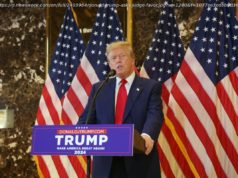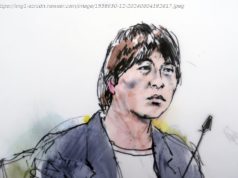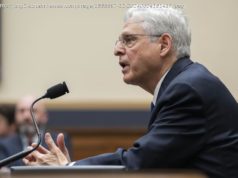Sen. Dianne Feinstein released a semi-redacted transcript of testimony Fusion GPS co-founder Glenn Simpson gave to the Senate Judiciary Committee.
Sen. Dianne Feinstein (D-Calif.) released a semi-redacted transcript of testimony Fusion GPS co-founder Glenn Simpson gave to the Senate Judiciary Committee on August 22,2017. Simpson had called for release of the testimony in a New York Times op-ed proclaiming the importance of transparency. Simpson and other Fusion GPS principals have resisted invitations to testify from the committees investigating Russian meddling in the 2016 campaign. When faced with a subpoena, Simpson used his Fifth Amendment right against self-incrimination to negotiate for a closed-door interview in front of the Senate Judiciary Committee.
The transcript of the testimony runs 312 pages. Feinstein excluded exhibits that were attached to the testimony and redacted highly relevant information about which FBI agents were working with Clinton-funded operatives to investigate the Trump campaign.
During the testimony, staff for Republican chairman Sen. Chuck Grassley alternated with staff for ranking member Feinstein, each group taking one hour at a time. The two followed different paths of questions. Republicans drilled down on Fusion GPS’s work for Russian company Prevezon Holdings before discussing the work on the Russia dossier. Democrats focused on the contents of the dossier before asking about other Russian contacts.
Fusion GPS is facing scrutiny about whether its work for Prevezon violated federal requirements to register as a foreign agent, whether people mentioned in the unverified and salacious dossier were defamed, and all sorts of unanswered questions about its work creating the dossier on behalf of Hillary Clinton and the Democratic National Committee.
In his testimony, Simpson didn’t answer or carefully answered questions covering areas where he’s legally vulnerable while also defending the dossier product he commissioned. Here are key takeaways.
While the testimony is full of details, far and away the most interesting revelation was Simpson’s claim that the FBI had a source within the Trump campaign. Simpson said that Christopher Steele, the freelance spy paid for dispatches about Trump, was told by an FBI official that they had confidential informant in the Trump campaign. This “human source from inside the Trump organization” was acting in a “voluntary” manner. It was someone “who decided to pick up the phone and report something.”
Understandably, that was the big headline many media outlets put with their initial stories on the transcript, including USA Today: “Dossier author Christopher Steele told FBI had source inside Trump Org” and the Washington Post: “Ex-spy behind Trump dossier was told FBI had source inside network, testimony reveals.” The only problem is that it apparently is not true.
Ken Dilanian, the NBC reporter who frequently helps Fusion GPS disseminate stories for its clients, said that “a source close to Fusion GPS” had a correction to offer:
While Simpson used his Fifth Amendment right against self-incrimination to negotiate an interview that was not done under oath, it’s still a federal crime to give the committee false information. It is unclear if he corrected the false testimony with the committee or just worked through his collaborator Dilanian.
Sometimes the dossier contained publicly known information, such as Carter Page’s trip to Moscow, or Vladimir Putin’s well-known dislike of Hillary Clinton. As for the salacious and substantive claims of collusion between Donald Trump and Russia, they remain salacious and unverified.
In their testimony on the Hill, various FBI officials have been unable or unwilling to cite anything that was verified from the dossier other than the Page trip or Russian animosity toward Clinton. The creator of the dossier himself told a British court that the information he collected was “ unverified.” In his testimony, Simpson says his confidence in the dossier is based on his confidence in Steele, who he says has a history of providing good information.
He says that unlike actual evidence that can be introduced in a court of law, the gossip Steele provided is different. “So by its very nature the question of whether something is accurate isn’t really asked. The question that is asked generally is whether it’s credible,” he says. “You don’t really decide who’s telling the truth.”
When Simpson talks about having Sen. John McCain share the document with FBI leadership after the election, he still doesn’t know if it’s accurate, explaining, “we just wanted people in official positions to ascertain whether it was accurate or not.”
Another interesting tidbit from Simpson is that Steele contacted the FBI because of his belief that Russians had a compromising tape of Trump in a hotel room, referring to the dossier’s allegation that Trump had prostitutes urinate on a bed that President and Michelle Obama had slept on in the Ritz Carleton in Moscow. Amazingly, Simpson reveals this shortly after saying that Steele is a professional at knowing when he’s getting disinformation from a source. But not only is there no evidence that Russians have such a tape, or that such a tape would have any value against known perv Trump in any case, there’s substantial evidence that Steele was the victim of misinformation at best, if not disinformation.
The single most famous and salacious vignette from the dossier is this “golden shower” scene in the hotel room during a 2013 trip to Moscow. Yet this summer, President Trump’s longtime bodyguard Keith Schiller told congressional investigators that on that trip someone offered to send five women to Trump’s hotel room. Schiller said he took it as a joke, and declined. He also testified that he told Trump about it when he escorted him back to his hotel room and that the two had a laugh. From this nugget of reality was spun a pornographic and difficult to believe scene of Trump using prostitutes to defile the Obama hotel bed.
The reality of the scene versus the unverified dossier’s version of events speaks to the credibility of everything that’s in the dossier. It also speaks to Steele’s ability to discern fact from fiction, and good intelligence from getting played. For that matter, it speaks to Simpson’s judgment about the quality of his researchers.
Yet when congressional investigators asked Simpson if Steele would know if he were being fed false information, Simpson is vehement. He says, “a trained intelligence officer can spot disinformation that you or I might not recognize, certainly that was Chris’s skill, and he honed in on this issue of blackmail as being a significant national security issue.”
This has already been reported extensively, but Steele was sharing information with the FBI. As mentioned above, he immediately took the fantastical sex scene from his first dispatch to the FBI. Simpson details how that happened, asserting over and over that he had nothing to do with going to the FBI with the opposition research he was commissioned to produce for Hillary Clinton and the Democratic National Committee. He says that Steele said of the FBI, “they want everything I have.”
Simpson says that the FBI paid for Steele to travel to Rome to share the information, and that they talked about a further financial relationship that didn’t come to fruition. Simpson does reveal that the FBI was also sharing information with Steele. As mentioned in the first point above, the FBI told him they had a source who was corroborating their salacious allegations. It is unclear whether the FBI official was wittingly or unwittingly sharing FBI intelligence with someone being paid by Hillary Clinton and the Democratic National Committee.
Simpson also reveals that he told media outlets that the FBI and Steele were working together. He told congressional investigators that he viewed Steele’s chats with the FBI to be separate from the work he was hired to do by Clinton and the DNC. However, he did admit to highlighting the fact that Steele had interacted with the FBI when he was selling journalists on the dossier before the election.
It’s also worth noting that Congress was briefed on the contents of the dossier during the campaign by the FBI, not Steele or Fusion GPS. That’s according to a Fusion GPS-sourced story in September 2016 by Michael Isikoff for Yahoo! News. The relationship between the FBI and Steele, based on unverified information, was serious.
Sometimes when Simpson is speaking about Russia, such as when discussing why he was investigating Trump’s ties there, he is unsparing. Simpsons says, “one of my interests or even obsessions over the last decade has been corruption in Russia and Russian kleptocracy and the police state that was there.” He says he’s well-versed on Putin’s consolidation of power.
But the other part of the testimony is about his work for Prevezon Holdings, a firm owned by the son of Pyotr Katsyv, a powerful Russian government official. It battled with the U. S. government over its handling of some of its money, settling a few months ago. Fusion GPS was tasked with digging up dirt on Bill Browder, a businessman who launched an international campaign for sanctions against Russia.
One of the key figures in the testimony is Natalia Veselnitskaya.






